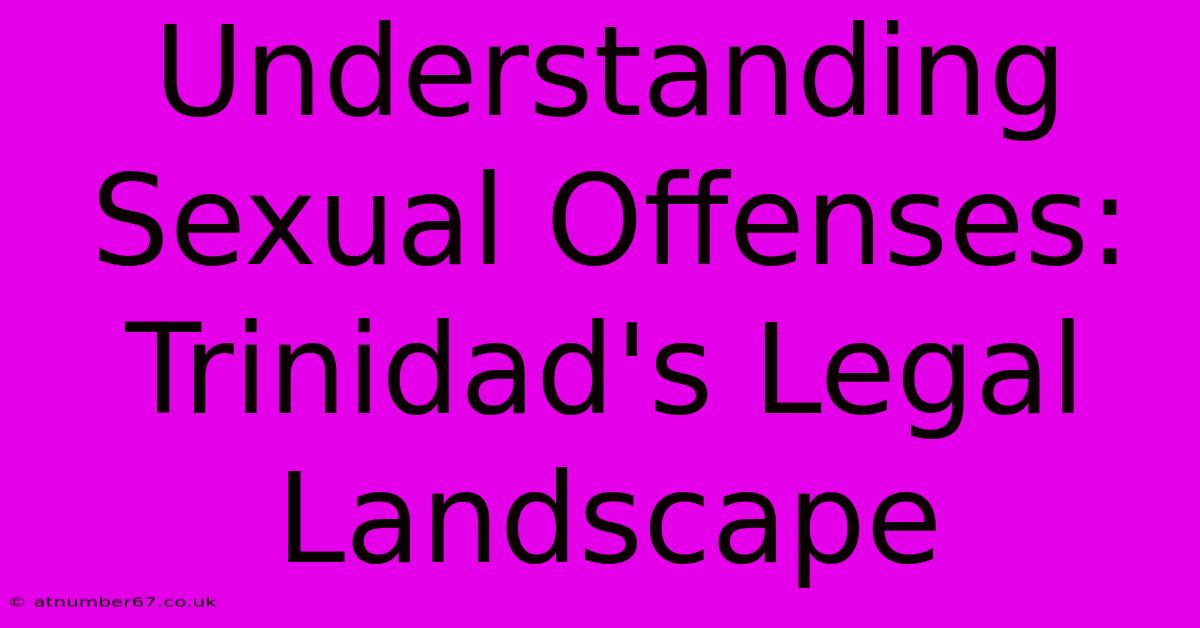Understanding Sexual Offenses: Trinidad's Legal Landscape

Table of Contents
Understanding Sexual Offenses: Trinidad's Legal Landscape
Trinidad and Tobago has a complex legal framework surrounding sexual offenses, constantly evolving to address societal changes and challenges. Understanding this landscape is crucial for victims, legal professionals, and the public alike. This article provides an overview of key aspects of sexual offense legislation in Trinidad and Tobago. Note: This is for informational purposes only and does not constitute legal advice. Always seek counsel from a qualified legal professional for specific legal guidance.
Key Legislation: The Sexual Offences Act
The primary legislation governing sexual offenses in Trinidad and Tobago is the Sexual Offences Act. This Act consolidates and modernizes previous legislation, encompassing a wide range of offenses, including:
-
Rape: Defined as unlawful sexual intercourse without consent. The Act specifies different levels of severity based on factors like the victim's age and relationship to the perpetrator. The definition explicitly addresses the crucial element of consent, highlighting that silence or passivity does not constitute consent.
-
Sexual Assault: This covers a broader range of non-penetrative sexual acts without consent, including touching, groping, and other forms of unwanted sexual contact.
-
Buggery: This refers to anal intercourse, which carries severe penalties under the Act.
-
Indecent Assault: This involves acts of indecency without penetration, often focusing on unwanted sexual touching.
-
Sexual Exploitation of Children: This section addresses the severe consequences of sexual abuse involving minors, focusing on acts like sexual grooming, online exploitation, and child pornography. The Act specifically protects children and emphasizes the vulnerability of minors in these situations.
-
Sexual Harassment: The Act outlines various forms of sexual harassment, covering verbal, non-verbal, and physical behaviors in various settings, from the workplace to public spaces.
Understanding Consent: The Cornerstone of Sexual Offenses
The concept of consent is absolutely central to all sexual offenses. The Act emphasizes that consent must be:
- Freely given: Consent cannot be coerced, pressured, or manipulated in any way.
- Informed: The person must understand the nature of the act they are consenting to.
- Ongoing: Consent can be withdrawn at any time, and continuing after withdrawal constitutes a sexual offense.
The Act explicitly states that silence, passivity, or intoxication do not constitute consent. Any ambiguity regarding consent must be resolved in favor of the victim.
Reporting Sexual Offenses and Seeking Support
Reporting a sexual offense can be a daunting experience, but crucial for seeking justice and support. Victims can report to:
- The Trinidad and Tobago Police Service: Specialized units within the police force handle sexual offense cases with sensitivity and professionalism.
- The Rape Crisis Society of Trinidad and Tobago: This organization provides critical support and counseling to survivors of sexual violence.
- Other Non-Governmental Organizations (NGOs): Several NGOs offer support, advocacy, and legal assistance to victims of sexual assault.
Challenges and Ongoing Developments
Despite the strengthened legislation, challenges remain in addressing sexual offenses in Trinidad and Tobago. These include:
- Underreporting: Many cases of sexual assault go unreported due to fear, stigma, and lack of trust in the justice system.
- Conviction Rates: Securing convictions in sexual offense cases can be challenging due to evidentiary issues and difficulties in proving the lack of consent.
- Addressing Systemic Issues: Efforts are ongoing to address broader societal issues contributing to sexual violence, including gender inequality, cultural norms, and the lack of awareness regarding consent.
Conclusion
The legal landscape surrounding sexual offenses in Trinidad and Tobago is complex and constantly evolving. A thorough understanding of the Sexual Offences Act, the crucial role of consent, and the available support services is paramount for both victims and the wider community. By promoting awareness, advocating for survivors, and working to address systemic issues, Trinidad and Tobago can strive towards a safer society and improve the justice system's response to sexual violence. Remember, seeking help is a sign of strength, and support is readily available for those who have experienced sexual assault.

Thank you for visiting our website wich cover about Understanding Sexual Offenses: Trinidad's Legal Landscape. We hope the information provided has been useful to you. Feel free to contact us if you have any questions or need further assistance. See you next time and dont miss to bookmark.
Featured Posts
-
Emmy Rossum Shares Heartfelt Message About Daughter
Apr 04, 2025
-
The Royal Secret Mary Boleyns Sons Identity
Apr 04, 2025
-
Youssef Omar Age Achievements And Legacy
Apr 04, 2025
-
Amber Roses Net Worth A Testament To Hard Work
Apr 04, 2025
-
Andrew Schulzs Net Worth A Step By Step Analysis
Apr 04, 2025
